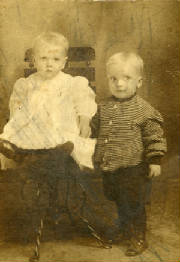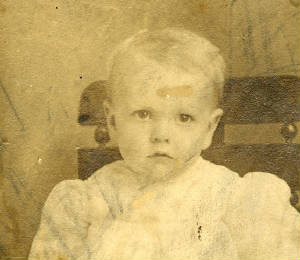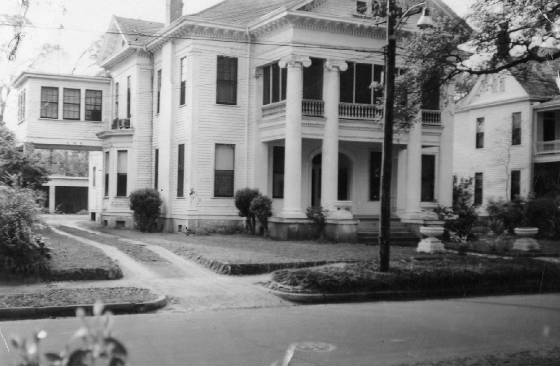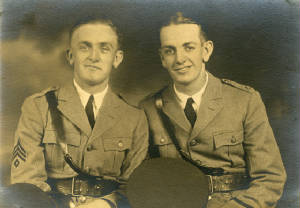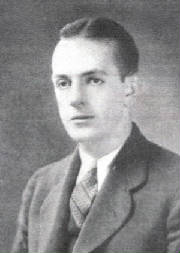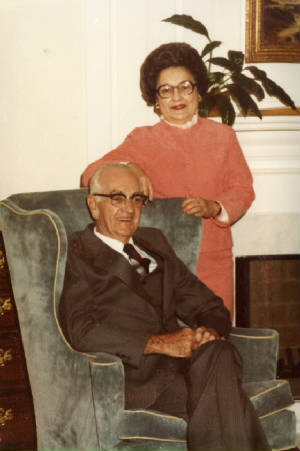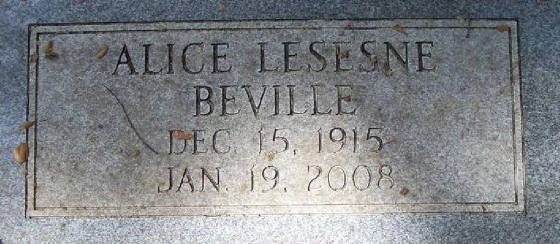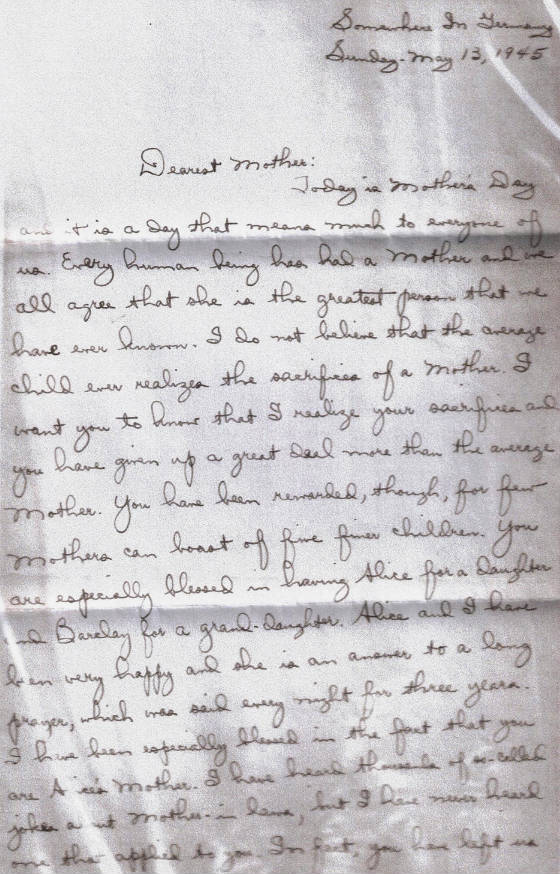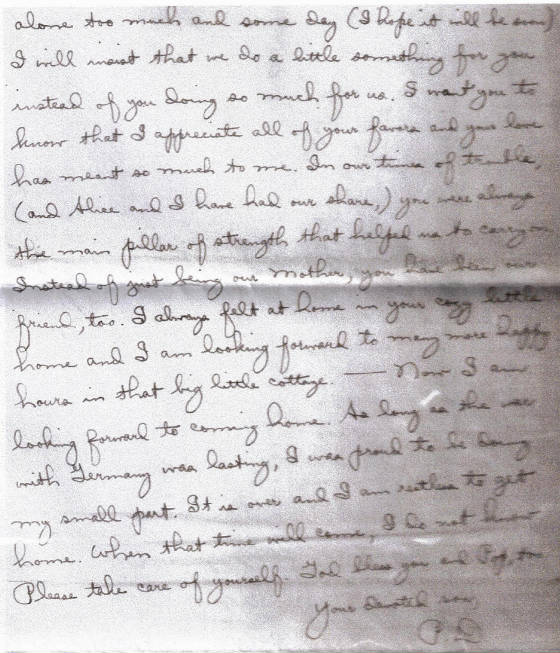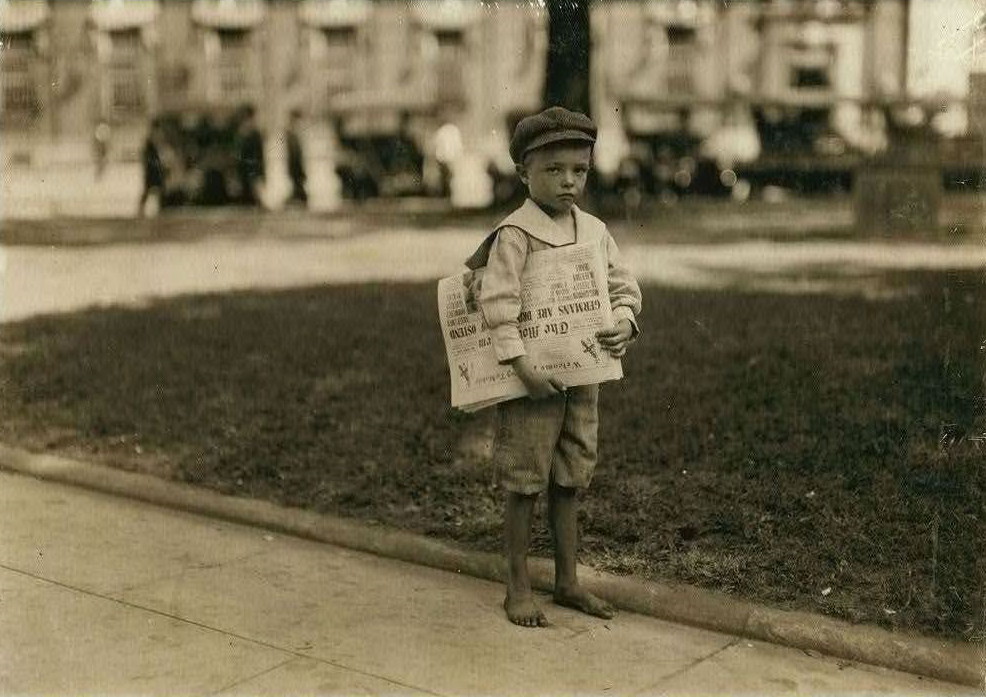
Lewis Hine caption: 7 year old Ferris. Tiny newsie who did not know enough to make change for investigator. There are still too many of these little ones in the larger cities. Location: Mobile, Alabama, October 1914.
“When I used to go to Girl Scout camp, my daddy would send me a letter every single day, and he would paste cartoons all over them. -Linda Arnold, daughter of Phares Beville
Lewis Hine traveled to Alabama four times, in 1910, 1911, 1913, and 1914. He photographed children working in cotton mills, fish canneries, coal mines, and selling newspapers on city streets. Among the more than 200 pictures available in this collection are a number of unforgettable images, including this little newsboy in Mobile called Ferris. But Mr. Hine did not tell us his last name, and I wanted to find out what it was.
The first thing I tried was to look in the 1920 census for all white males living in Mobile who were born about 1907, and had a first name that looked or sounded like Ferris (I used the Soundex tool in Ancestry.com). I found just one possibility, a Phares Beville, born in Florida in 1907, to Peter and Pauline Beville. Peter was part owner of an auto dealership. I also found Phares (spelled Pharis) in the 1910 census, living with the same parents, in DeFuniak Springs, Florida, where his father worked as a salesman.
And then I found his death record. Phares died in Mobile, in 1991. I emailed the Mobile Public Library and asked for a copy of his newspaper obituary, and received it in a couple of days. Among his survivors were daughter Linda Arnold and grandson Paul Darden. The most important question I needed to ask them was whether Phares and Ferris were the same person? At this point, I had to hope that they were.
I called Mr. Darden first. He was surprised, but after seeing the photo, which I emailed to him, he said he had no idea if the newsboy was his grandfather. But he said that Ms. Arnold, his aunt, might know, so he told me he would forward the picture to her. I called her the next day. She said that she wasn’t sure if the newsboy looked like her father, but told me, “Until the Depression in 1929, my father’s family was very wealthy, and the barefooted boy in the picture looks very poor. My father would never have been working when he was seven years old.” I told her that studies of newsboys at that time indicated that not all of them came from poor families. She also didn’t think that her father and his family moved to Mobile until a few years later. I asked her if she had any photos of him as a child or a young man, and she offered to send me a baby picture.
There was no doubt in my mind that the baby and the newsboy were the same person. I showed the photos to two friends of mine, one a former professional photographer, and the other an art photographer. They agreed with me. One of them said: “Well, the baby has the same eyes, the same nose, the same mouth and the same chin; but most importantly, the same look on his face. It’s uncanny.”
And then I turned to Maureen Taylor, an internationally recognized photo identification and family history expert. I have consulted with her a number of times, and she has been most helpful. She came to the same conclusion. I also found one additional important piece of information. Phares Beville’s 1991 obituary said that he had lived in Mobile for 78 years, or since 1913, the year before the picture was taken.
So it was back to daughter Linda Arnold with the results. She laughed and commented that it was still a huge surprise that her father was a newsboy, but the baby did look like him and, “If it’s him, it’s him.” I interviewed her, and she sent me many family photos. I also talked to Beville Darden Dunkerley, granddaughter of Phares. With the information they gave me, I was able to find a great deal more about Phares and his family on various genealogy websites, and in newspaper archives.
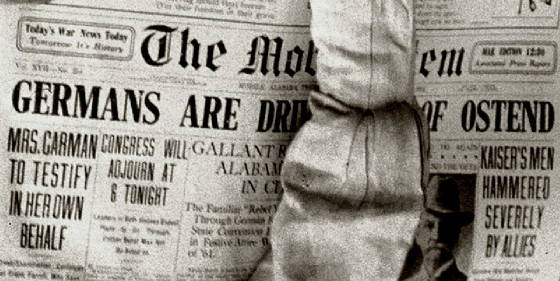
By looking at the Hine photo upside down, and then blowing it up and tweaking it with Photoshop, I was able to determine that the newspaper was the Mobile Item, an afternoon paper that was published from 1912 to 1917, and then was bought by the Mobile Press (now the Press-Register). I was also able to find the exact date of the photo by using the headline regarding the adjournment of the Congressional session, which turned out to be October 22. So Phares had turned seven years old only five weeks earlier.
Twenty years later, in a strange twist of fate, Phares, the newsboy, became a career employee of the Press-Register, first as a bookkeeper in 1934, and then as the national advertising manager, from 1936 until his retirement in 1970.
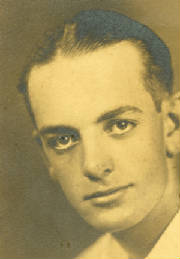
Phares Demoville Beville, later commonly called P.D. Beville, was born in Florida on September 14, 1907. He was the second oldest of five children born to Peter Demoville Phares (also called P.D.) and Pauline (Lewis) Beville, who married in Florida about 1904. Peter was working as a salesman for the Lewis Bear Company, a grocery wholesaler.
His parents were Alabama native Phares Beville, who was a Civil War veteran and surrendered with Robert E. Lee at the Battle of Appomattox; and Mississippi native Annie Demoville Beville. Going back another generation, I found Thomas Ludwell Beville, born in Alabama in 1814, who married Mary Ann Phares. That explains the origins of the names Phares and Demoville.
Phares moved with his family to Mobile in 1913, where his father became part owner of an automobile dealership officially named P.D. Beville Supply Co. They were living at a house on 902 Government Street, now the site of a CVS pharmacy. By 1920, his parents owned a house at 110 South Georgia Avenue, just half a mile from their previous residence. It is still there.
In their high school years, Phares, and his older brother Newell, attended UMS-Wright, a military prep school in Mobile. In 1926, Phares enrolled at Washington & Lee University, in Virginia, where Newell was already a student. His yearbook records indicate that he was a member of the Cotillion Club and the White Friars. In 1929, one semester short of graduation, Phares left the university and returned to live with his parents due to the death of his 12-year-old brother Lewis.
Phares took a job as treasurer of his father Peter’s auto dealership, which had been hit hard by the Depression. His father was also employed as a vice-president of a regional office of the Morgan Plan Company, a bank and loan company. By that time, brother Newell, also living at home, was working for the auto dealership. By the mid-thirties, Peter’s sole source of income was a pecan farm he owned in Grand Bay, Alabama, and Newell was working in Mobile as a salesman for the Quigley Motor Car Co. In 1934, Phares was hired as a bookkeeper for the Mobile Press Register, and two years later, he was appointed to the position of national advertising manager.
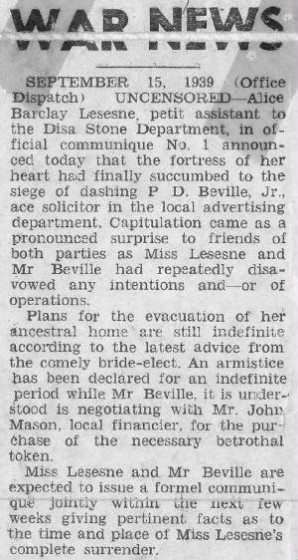
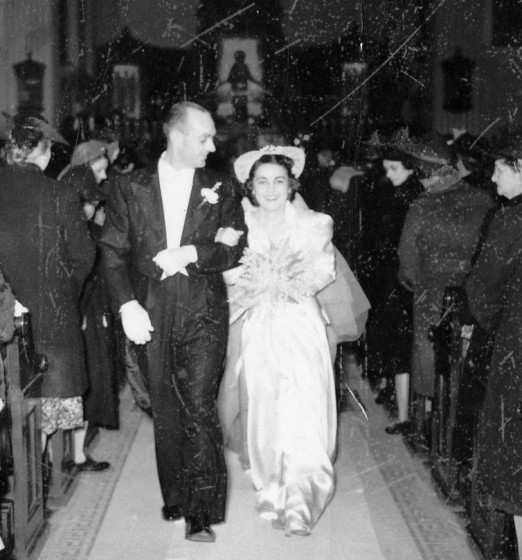
Phares married Alice Barclay Lesesne in Mobile, on January 15, 1940. Following the birth of their first daughter, Barclay, in 1943, Phares enlisted in the Army, and served two years. The second of two children, Linda, was born in 1947. Phares passed away in Mobile, on March 14, 1991, at the age of 83. Alice passed away 13 years later, on January 19, 2004, at the age of 92.
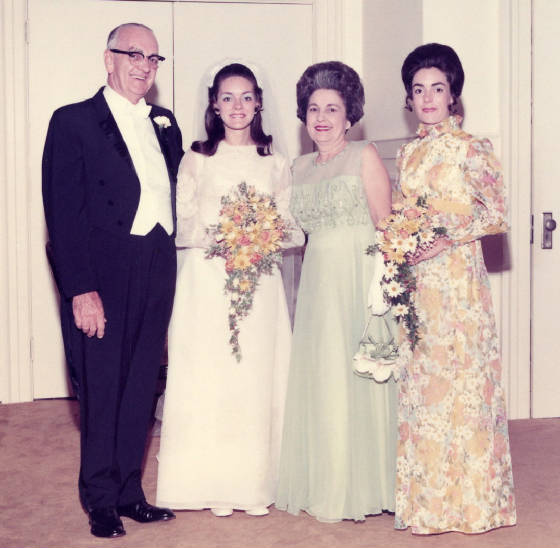
Edited interview with Linda (Beville) Arnold (LA), daughter of Phares Beville. Interview conducted by Joe Manning (JM) on March 4, 2013.
JM: When were you born?
LA: 1947. I have an older sister, Barclay, who was born in 1943.
JM: Where were your parents living at the time you were born?
LA: They were renting a house on South Georgia Avenue, right across from my father’s parents’ home at 110 South Georgia.
JM: According to the census, your parents were living on South Anne Street in 1940.
LA: They married in 1940, and that’s where their first apartment was.
JM: Where was your father working when you were growing up?
LA: For the newspaper. Before my father married my mother, his father had owned a Cadillac dealer, and my father was the secretary and treasurer of the business. But the company went belly up in the 1929 crash. I was told that my father was very popular as a young man. He dated a lot, and he also put his younger brother Peter through college. Uncle Peter went through the University of Alabama, and my father paid for most of it. That was probably why Daddy didn’t get married till he was 32 years old.
When I was born, my father worked for the Mobile Press Register, and he did that the rest of his life, until he retired. He was the national advertising manager. He was responsible for selling advertising. He worked six days a week. He never had a day of his entire adult life that he did not go into the office, except when he was on vacation. And he never was sick a day in his life, until after he retired.
JM: He even worked on Sundays?
LA: The Press Register was right next to our church. On most Sundays, he would go over and pick up his mail. He actually had two other jobs, at the same time. One of his best friends owned a furniture store, and my father wrote all of his ads, and was paid for it. He would do that at night. When his father died in about 1950, he left a 150-acre pecan farm to my daddy and his brother Peter. For my entire life, that farm kept us economically in the middle class, because my father never earned more than $12,000 a year at the Press Register. The farm was in Grand Bay, Alabama. They had somebody that lived on the farm. During pecan season, my daddy would go down and tend to it. He eventually sold off the farm piece by piece, and that financed his retirement.
JM: Because he worked so much, does that mean that you hardly ever saw him?
LA: No, not at all. We sat down as a family every single night at six o’clock for supper. We’d talk about what happened during the day. I don’t remember a day when we were growing up that we didn’t have dinner together, except if my sister or I was visiting friends. I don’t remember not having Sunday lunch together.
JM: Did your parents ever own a house?
LA: Yes, at 14 Elizabeth Place, which they bought when I was about three. We didn’t sell the house until we had to put my mother into assisted living.
JM: Did you ever go into work with your father?
LA: Sure, mostly on weekends. I was like his unofficial secretary.
JM: Did you go to college?
LA: I graduated from college, but my sister didn’t finish. My father had gone to Washington & Lee, but he pulled out a semester before graduating, because his 12-year-old brother Lewis died from appendicitis, and he felt the family needed him. It was really important to my father that we go to college. Since I don’t have any children, except some stepchildren, I had a career. He was so proud of that. When I was finishing up my sophomore year in college, I was getting pretty tired, and I told my daddy I didn’t want to go back. He said, ‘Don’t be ridiculous, you’re going back.’ It didn’t occur to me to argue with him. I would have done anything he wanted me to do. I graduated from the University of Alabama. I worked in the banking industry as a resource executive, and later, I had my own business.
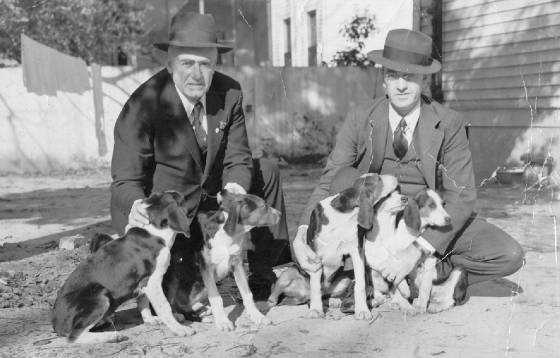
LA: My father was a most honest man. There was no room for deceit with him. No matter what you did, if you were honest with him, you weren’t punished. My mother said Daddy had issues with his father. He never felt like he was good enough for his father, and he had a complex about it. I think his father was sort of a bully. That may be the reason why my father never disciplined or criticized us. If we got any discipline at all as children, it was from my mother.
He was the “go-to” person in the family, even though he wasn’t the oldest. He took care of every family need or crisis. He took care of people. My mother had a heart attack when she was 58. She was in the hospital for about a month, and he took her flowers from his garden every day.
I learned a lot from my daddy from watching him, as opposed to what he said. He was always hospitable. He loved people, and they loved him. I never saw him do an unkind thing. He was very committed to his church, the Presbyterian Church. He was extremely active in the community. He was president of the YMCA and Kiwanis Club. He, and my mother, too, set the example for me and my sister about community involvement.
My father loved children, and he probably would have had 20 if my mother could have had that many. Not all men are great with little children, but he was. When I used to go to Girl Scout camp, my daddy would send me a letter every single day, and he would paste cartoons all over them.
JM: What was your mother like?
LA: She was petite, and very beautiful till the day she died. She was very interesting to my friends, and she was always interested in them. There was always a place at the table for them, and an extra bed if they slept over. But she suffered anxiety. I’m sure my father had to deal with it. Right after I was born, she went to a clinic, and they recommended that she see a psychiatrist. She thought that was ridiculous. Back then, you just didn’t do that. But I never realized that she had these issues until I was an adult. She was good at hiding it.
JM: According to the ship passenger lists, your mother and father landed in New Orleans on January 25, 1940. They gave their address as Mobile.
LA: They were married on January 15. The Press Register paid for their honeymoon. They were on a ship and sailed around Cuba.
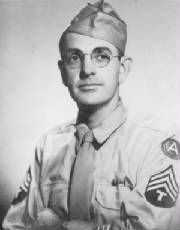
JM: I found records that your father served in World War II.
LA: He tried to enlist when the war broke out, but they wouldn’t take him because he was too old. But later they took him. He said his unit was a mix of 17-year-olds and 38-year-olds. He was not on the front lines; he was in supply. He was stationed in Germany. He participated in freeing some of the people in concentration camps. But he never talked about it. He would never go to a war movie.
JM: Why did your father have “Jr” on the end of his name? His father was Peter.
LA: He gave himself that title. Maybe he was just trying to please his father. His full name was Phares Demoville Beville, but he always hated his name. At some point in his life, he started using P.D. Beville. Everybody called him P.D.
JM: When you saw the photo, you didn’t think the boy could possibly be your father, because you told me that his father had a lot of money, and would not have had any reason to send his son out on the street to sell newspapers.
LA: It just didn’t seem to fit. But I’m not ashamed of the fact that he was working at the age of seven.
JM: How were your father’s retirement years?
LA: He worked till he was 70. By then, he had sold the farm. He became a paid employee of the Kiwanis Club, for which he had been president at one point. He did their publications, and he was also the treasurer. But it was part time. He was an avid gardener. He loved working in the dirt. He would go out at six o’clock in the morning, come in for lunch, and then go back out and work until five. He turned the front yard into a vegetable garden.
It’s funny, but he actually made more money in his retirement than when he worked, partly because of some good investments. He died in 1991, at the age of 83. My mother died in 2008, at the age of 92. She had a stroke when she was 85. We put her into assisted living, and then into a nursing home. She was active until she had the stroke. She worked at the hospital once a week, and did work for the church.
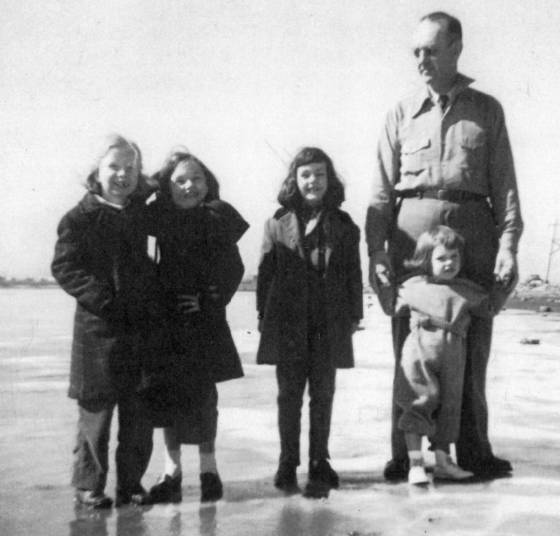
“My favorite picture of my daddy and me is when I look like I was about three years old. Mobile Bay was frozen over. I am standing in front of him, and he’s holding my hand. And that’s what he did throughout my whole life. He continues to be a real presence in my heart.” -Linda Arnold
“My grandfather was the kindest person I’ve ever met, very loving, and the best hugger in the whole world. When we would visit him, I remember running through the door and giving him a big hug. I also remember sitting in his lap while he would read me a book, and going out with him to his garden and picking tomatoes. He was very soft-spoken, and being the only man in a house full of girls, he would just let the girls gab while he sat back and smiled. He used to talk a lot about fishing, which he loved. He would bring home fresh shrimp, which my grandmother would turn into a gumbo that no restaurant could ever replicate. And any vegetables that they served would likely come from my grandfather’s garden. My grandmother was your typical Southern belle. She always had a face full of makeup, and wore a dress and high heels, even when she went to the grocery store. She always looked like a perfect lady. She was sweet, and she never spoke ill of anyone.” -Beville Darden Dunkerley, granddaughter of Phares and Alice Beville
Below is a newspaper article about Phares Beville’s service in World War II, and also a letter he wrote from Germany to his mother-in-law just after V-E Day in 1945. His lovely and gracious words are a fine example of why his family remembers him with great affection, 100 years after he was a 7-year-old barefoot newsboy.
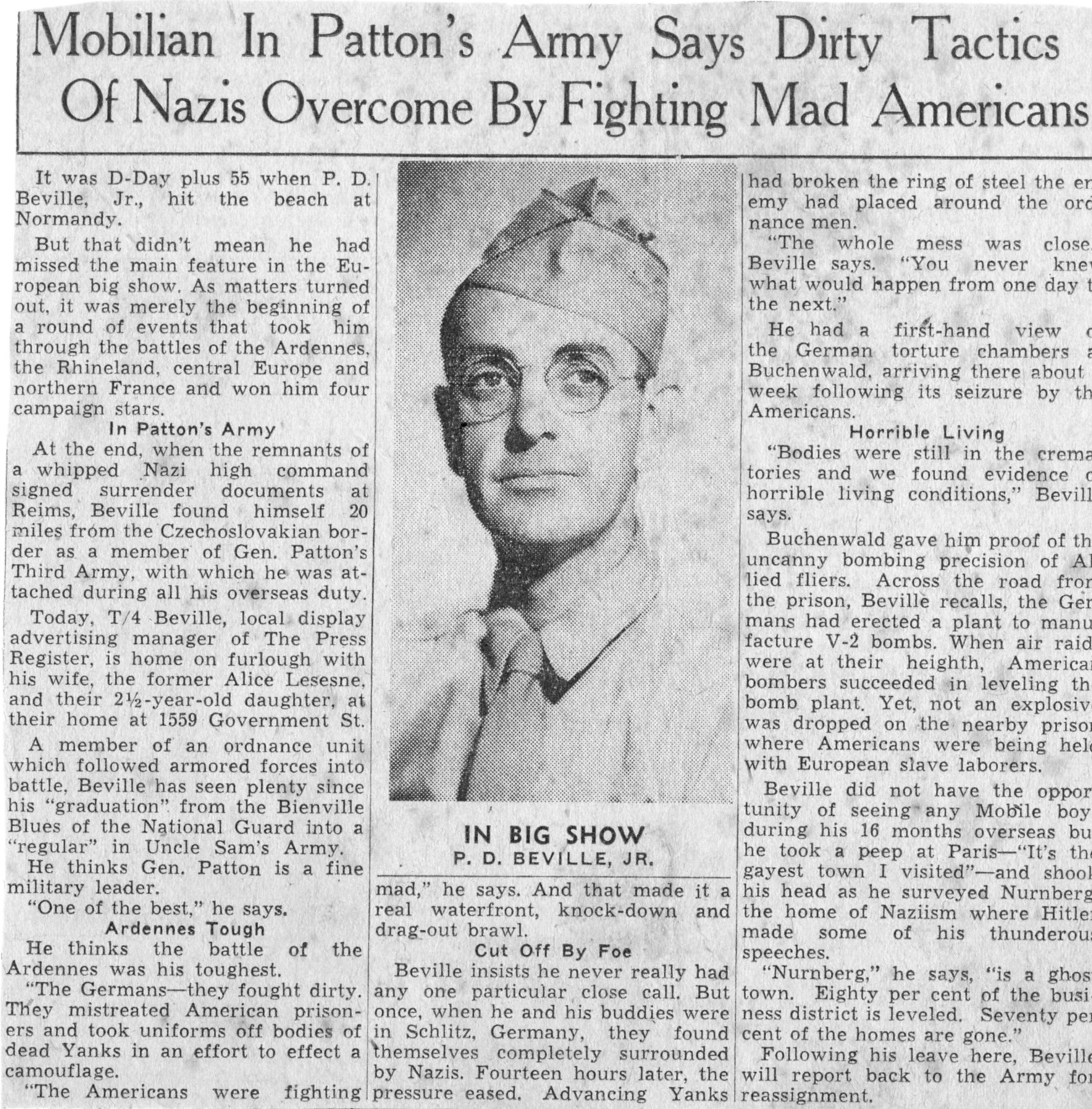
*Story published in 2013.
